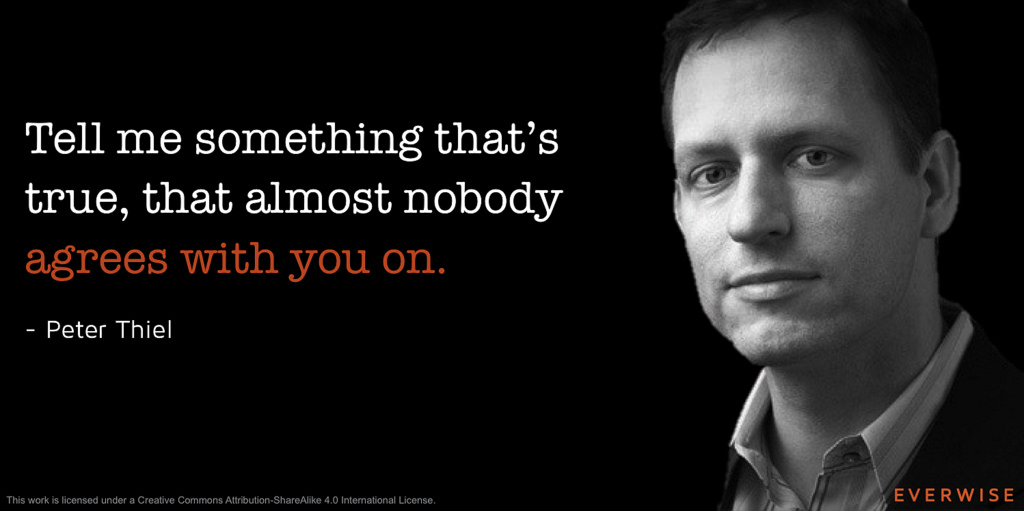This post has been read 3890 times!
 January 12, 2019- by Steven E. Greer, MD
January 12, 2019- by Steven E. Greer, MD
A friend gave me a copy of Peter Thiel’s 2014 book called Zero to One. The name refers to his concept that true value creation makes something out of nothing, or one out of zero (concepts like this are mocked so well by Mike Judge’s Silicon Valley show). The book is based upon detailed notes taken by one of Thiel’s Stanford MBA students during a course Thiel taught about Silicon Valley startups.
This is a decent book to read. It has some useful philosophy (Thiel clearly took philosophy courses and read Shakespeare). But despite Thiel listing numerous examples of mistakes made in Silicon Valley caused by hubris and bubble-think, his book suffers from the biggest misconception among tech startups, which is that tech startups are worth their inflated valuations and the founders are clever geniuses who deserve their billions.
In fact, no Silicon Valley company is worth the valuations. None of the founders were the next Einstein. They all benefited from the global problem of too much cash and too few ways in which to invest it. Central banks around the world are printing fictional money. The elite ruling class gets that free money, and then they need some way to exchange it into assets. Enter Silicon Valley and its plethora of scams that check the boxes for managers of pension funds or Chinese wealth.
There will be another Dot-com bubble burst soon. Many of the biggest names, such as Amazon and Facebook, have already lost 30% or more of peak valuation. But this book does not hint at that gorilla in the room.
To admit that tech stocks benefit from the macroeconomic need for places to park cash would shatter Peter Thiel’s ego. It would discredit the myth that Thiel and others have earned their money through sheer genius.
Peter Thiel is a smart man, but he is not the contrarian creative person he fancies himself. He cannot even understand basic economics.
Thiel is best known for creating PayPal, along with Elon Musk, Reid Hoffman, and the rest of the PayPal mafia. PayPal started as an idea to create a digital currency to replace the government currencies. However, the company would have failed and gone belly-up along with the rest of the Dot-com Bubble victims had it not been for a big stupid company, eBay, that acquired them. The grand vision to change the world with a digital currency was a bust, as is the current Bitcoin cryptocurrency craze.
In proudly stating that this was the goal of PayPal, Thiel exposes his ignorance. The US dollar and currencies of other Super Powers are the only real things that define those countries and imparts them power. If some Silicon Valley nerd tried to make the dollar irrelevant, all it would take would be a simple regulatory move by the Federal Reserve or Treasury to make the value of PayPal, back then, or Bitcoin, now, to lose all value. True, the US dollar is imaginary too and not based on gold, but it has nuclear weapons backing it up. PayPal has no army.
Thiel thinks he is so smart that he can teach other smart people at Stanford how to do it. Why? Because he invested in Facebook and won the lottery? How about his strong belief that Lyft would do better than Uber? Oops. He was wrong there. The entire taxi-alternative business model has been crushed by city regulators and mismanagement by the tech CEOs.
Nowhere in his book does Thiel go into detail about his hundreds of bad investments. In fact, the entire list of companies in which Thiel has invested reads like a Mike Judge parody of failures. And why is he running a venture capital fund rather then running a real company if he is such a management genius?
It is also disturbing to read Thiel espouse the virtues of monopolies. At least he is honest and admits that Silicon Valley companies have baked into their business models the secret plan to capture monopoly economies. Of course, he spins these monopolies as actually be good for society. Google controlling our thoughts by censoring what we see on the Internet is good because of the utility that such a great search engine provides? Destroying millions of small businesses, as Amazon has done with its online retail near-monopoly is good for America?
Nowhere in this book does Thiel event hint that Google, Facebook, or Amazon need regulating and that almost all of the start-ups are going after advertising revenue, which means they will sell your personal user data. Thiel’s own company, Palantir, is nothing but an attempt to be a better Lexis Nexus or a private sector NSA.
Nowhere in this book does Thiel discuss the epidemic of social media and screen addiction which is harming brains of billions of kids around the world. His Facebook is the biggest drug dealer on the planet.
The most impressive accomplishment by Peter Thiel came after this book was published. Being a lawyer himself, he found and paid for a good lawyer, Charles Harder, to fight Hulk Hogan’s defamation battle as his own surrogate war (Thiel had a grudge with Gawker because the website outed him as a gay man.). They succeeded in destroying the online tabloid Gawker and forcing them into bankruptcy.
Again, this book is a good read and worth the effort despite Thiel’s self-delusions. He does make some good points. But the book is light on practical advice for the start-up founder and heavy on useless philosophy.
One can easily imagine what Thiel looked like teaching his Stanford course, from which the book is based. His delusions of grandeur and hubris would have been epic.
Thiel would have written a better Stanford MBA course syllabus and subsequent book had he spilled the beans on how to crack into the Silicon Valley mafia that he helped start. The best ideas in the world won’t make it past the receptionist of a venture capital firm unless they are blessed by some crony who knows somebody who is part of the mafia.
Update October 24, 2022-
First, my prediction made four years ago came true. Bitcoin has tanked. The other techs stocks are crashing, etc.
Now, what I did not mention back then is that Blake Masters wrote this book. This is why he was tapped by Thiel to become a U.S. senator.
